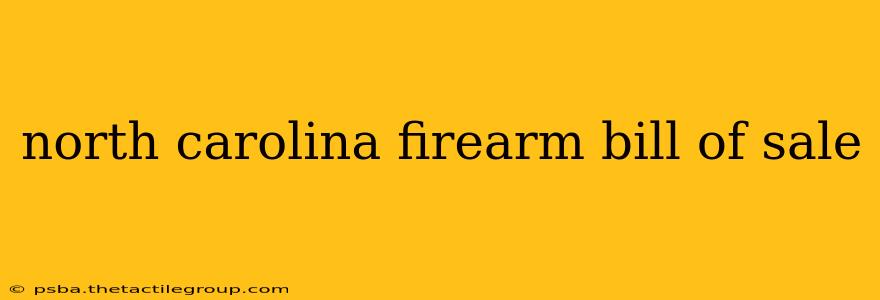Selling or buying a firearm in North Carolina requires careful adherence to state and federal laws. A properly completed bill of sale is a crucial part of this process, offering legal protection to both buyer and seller. This guide will walk you through everything you need to know about North Carolina firearm bill of sales, ensuring a smooth and legally sound transaction.
What is a North Carolina Firearm Bill of Sale?
A North Carolina firearm bill of sale is a legally binding document that records the transfer of ownership of a firearm from the seller to the buyer. It serves as proof of the transaction and helps establish legal compliance. While not mandated by North Carolina law in the same way as a federal form (like a 4473), it's highly recommended to use one for several important reasons, which we will detail below.
Why is a North Carolina Firearm Bill of Sale Important?
Using a firearm bill of sale offers numerous benefits:
- Proof of Ownership: In the event of theft, loss, or legal disputes, a bill of sale provides irrefutable proof of the firearm's legal transfer. This is crucial for insurance claims and potential legal proceedings.
- Record Keeping: Maintaining accurate records of firearm transactions is vital for both sellers and buyers. This helps avoid legal complications and simplifies compliance with future regulations.
- Due Diligence: A properly completed bill of sale shows both parties acted responsibly and legally during the transaction.
- Reduced Liability: A detailed bill of sale limits liability for both parties, especially the seller, who can demonstrate they followed proper procedures.
What Information Should a North Carolina Firearm Bill of Sale Include?
A comprehensive North Carolina firearm bill of sale should contain the following information:
- Date of Sale: The exact date the transaction took place.
- Seller Information: Full legal name, address, phone number, and driver's license or state-issued ID number.
- Buyer Information: Full legal name, address, phone number, and driver's license or state-issued ID number.
- Firearm Description: Detailed description including make, model, caliber, serial number, and any distinguishing features.
- Purchase Price: The agreed-upon selling price in US dollars.
- Method of Payment: How the buyer paid (cash, check, etc.).
- Signatures: Signatures of both the seller and buyer, acknowledging the agreement and transfer of ownership.
- Statement of Legality: A statement confirming the legality of the sale under both state and federal laws. Both parties should attest that they are legally allowed to own and transfer firearms.
Where Can I Find a North Carolina Firearm Bill of Sale Template?
While there isn't a standardized state-issued form, many websites offer free downloadable templates. It's advisable to find a reputable source to ensure the template includes all necessary information. Searching online for "North Carolina firearm bill of sale template" will provide numerous options. You can also consult with a firearms attorney or local law enforcement for advice.
North Carolina Gun Laws and Private Transfers
It is critical to remember that North Carolina, like all states, has specific laws governing firearm sales. Understanding these laws is crucial to avoid legal issues. Private sales in North Carolina generally do not require a background check through a licensed firearms dealer, but both parties must be legally allowed to possess firearms. Misrepresenting your eligibility to own a firearm is a serious offense.
Disclaimer:
This information is for educational purposes only and should not be considered legal advice. Always consult with a qualified legal professional or law enforcement for guidance on North Carolina firearm laws and regulations. Failure to comply with state and federal laws regarding firearms can result in serious legal penalties.

